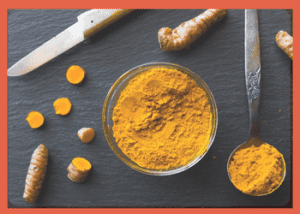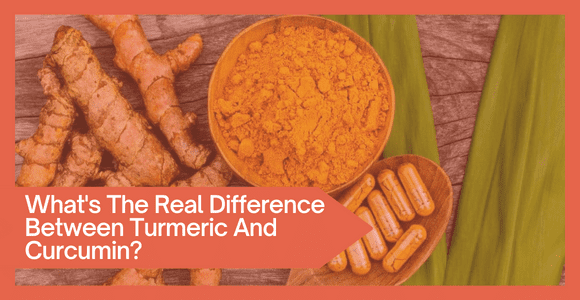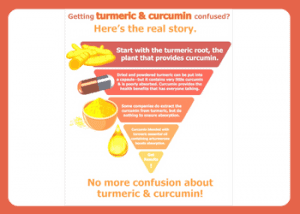Turmeric is used both in cooking and traditional medicine; it contains a potent, natural compound called curcumin. This element has been widely studied to unveil its health potential – but while turmeric and curcumin are sometimes confused with one another, there are critical differences between the two that should be acknowledged. Both turmeric and curcumin can reduce joint inflammation, cholesterol, blood sugar, as well as a tumor, fungal and bacterial growth.
We will delve into the parallels and disparities between turmeric and curcumin in this outline, including their respective purposes and advantages.
Table of Contents
What Are Turmeric and Curcumin?
Curcumin, comprising up to 8% of the total turmeric content, lends its deep hue and distinct flavor to this classic spice. The best curcumin supplement is one that provides high potency, high absorption, and high bioavailability, guaranteeing that you take in all the powerful anti-inflammatory and antioxidant properties of this compound.
Turmeric is derived from the root of Curcuma Longa (a perennial flowering plant classified in the ginger family), a gorgeous flower that belongs to the ginger family. It’s frequently on display in spice jars; however, if bought fresh it looks similar to ginger but has an even more vibrant hue ranging between yellow and gold.
 In India, turmeric is a renowned remedy for skin ailments, digestion issues, and aches. Turmeric contains curcuminoids.
In India, turmeric is a renowned remedy for skin ailments, digestion issues, and aches. Turmeric contains curcuminoids.
It’s an indispensable component of Ayurvedic medicine– the ancient Indian healing practice- due to its abundance in curcuminoids; natural compounds known for their powerful health benefits of turmeric.
Of the three prominent curcuminoids, curcumin is by far the most potent and beneficial to good health conditions.
These components include demethoxycurcumin and bisdemethoxycurcumin; however, none can compare to their proven effectiveness in aiding our overall well-being.
Turmeric and curcumin are related, but they aren’t interchangeable. So what is the gold standard for absorbability? With more than 50 published studies, the answer is a curcumin extract combined with turmeric essential oil containing ar-turmerone to boost absorption and retention in the bloodstream.
Turmeric Extract vs Powder
The difference between turmeric extract and powder lies in their composition and potency. Turmeric extract is made by removing the essential oils and concentrating the active ingredient, curcumin, into a standardized form. This results in a more potent form of turmeric with a higher concentration of curcumin.
On the other hand, turmeric powder is made by grinding the whole turmeric root and is less potent in comparison. When choosing between the two, it is important to consider the desired health benefits and individual needs. Some people may prefer to take a less potent form for general health, while others may want a higher concentration for specific health issues.
How to Get Curcumin from Turmeric?
Whether you’re an experienced chef or just starting out, extracting curcumin from turmeric is relatively easy. For optimal results, make sure to use organic fresh turmeric root and prepare it in a fashion that maximizes its bioavailability – your body will thank you!
For maximum absorption of curcumin, try blending turmeric with black pepper – the pepper contains a compound that aids in the process.
 Alternatively, you can look into supplements containing curcuminoids to enjoy all of turmeric’s health benefits. Regardless of your choice though, be sure to source only high-quality turmeric free from contaminants for optimal results.
Alternatively, you can look into supplements containing curcuminoids to enjoy all of turmeric’s health benefits. Regardless of your choice though, be sure to source only high-quality turmeric free from contaminants for optimal results.
If you’re looking for natural ways to improve your health, turmeric, and curcumin are two of the best options. These powerful alternatives offer a range of incredible perks that can benefit both body and mind.
One key factor to consider when taking curcumin is that it is best absorbed when paired with black pepper. Ginger, another Anti-pain herb, can also enhance the benefits of curcumin.
One effective form of curcumin supplementation is through Meriva, a curcumin extract combined with phosphatidylcholine for better absorption.
Curcumin is often found in tablet or pill form and it is essential to recognize that not all products are the same, so it’s prudent to purchase from a trustworthy company. When beginning a new supplement routine, it’s essential to consult with your healthcare provider as the recommended daily dosage of curcumin can fluctuate depending on the individual and their health objectives.
They Have Many Benefits for Common
Turmeric and curcumin are both medicinal herbs that offer a plethora of health benefits, as evidenced by 8 trusted sources.
Scientific research has provided ample evidence of the multiple advantages that turmeric and curcumin have to offer. Here are some examples:
- Osteoarthritis: Turmeric’s active compounds, including curcumin, have been known to reduce inflammation and provide much-needed relief for those suffering from osteoarthritis.
- Obesity: They have the potential to impede inflammation associated with obesity while promoting healthier fat levels.
- Heart disease: With the ability to reduce bad LDL cholesterol and triglycerides, turmeric and curcumin can help minimize our risk of developing heart disease.
- Diabetes: Both may potentially reduce the impacts of diabetes on your body by improving blood sugar metabolism.
- Liver: In a rat study, turmeric extract and curcumin were discovered to be beneficial for reducing chronic liver damage due to their ability in minimizing damaging oxidative stress.
- Cancer: Although further research is needed, preliminary studies suggest that turmeric and its primary active ingredient curcumin have the potential to reduce the growth of carcinogenic cells in both the colon and other parts of the body.
- Antifungal: They have the capacity to disturb fungal cell membranes, making them an effective supplement to traditional antifungal medications for improved results.
- Antibacterial: They have impressive antimicrobial properties, which can significantly diminish the growth of pathogenic bacteria.
Is turmeric the same as curcumin? They are not the same, but they are closely related. Add some spice to your life with turmeric! turmeric, may help to reduce inflammation. A flavorful staple often used in cooking, it also contains curcumin – a natural compound touted for its potential health benefits. In one study, turmeric was more effective at inhibiting the growth of breast cancer cells than curcumin alone (66 percent growth inhibition versus 33 percent).
Not only does this add an extra layer of flavor to foods, but you could be supplementing your diet with one of nature’s best-kept secrets at the same time.
10 Serious Side Effects of Turmeric
Negative effects include:
- Upset stomach and diarrhea: Ingesting high quantities of the product can cause stomach uneasiness and result in distressing symptoms like nausea, cramps, and looseness of the bowels.
- Increased risk of bleeding: Consumption of this substance may inhibit the process of blood clotting and amplify the potential for bleeding, especially when combined with medicines that thin out the blood.
- Interaction with certain medications: As it is known to interfere with anti-inflammatory drugs, blood thinners, and blood sugar medications, it’s essential to have a conversation with your doctor before taking this supplement.
- Risk of kidney stones: Consuming large amounts of dose can cause the formation of calcium oxalate stones in the kidneys, leading to irritating and uncomfortable symptoms.
- Iron deficiency: it can interfere with the absorption of iron, leading to iron deficiency in some people.
- Hormone disruption: It has been found that certain products may cause an imbalance in hormones, leading to side effects along with disruption of normal hormone levels.
- Allergic reactions: It is possible that certain individuals may experience a hypersensitive reaction, resulting in skin irritation, itching, and even difficulty breathing.
- Increased risk of liver damage: High doses can increase the risk of liver damage, especially in people with liver disease.
- Reduced blood sugar levels: may lower blood sugar levels, which can be dangerous for people with diabetes.
- Pregnancy and breastfeeding complications: Pregnant and breastfeeding women should avoid taking high doses of turmeric or curcumin, as it may have an effect on the fetus or newborn.
It is important to consult a doctor before taking turmeric supplements or using them in excessive amounts.
Curcumin is generally safe when taken as recommended, however, mild curcumin side effects such as nausea, diarrhea, and stomach discomfort can occur in some cases. When compared to turmeric, curcumin is a more concentrated form of the active ingredient in turmeric and has the potential for more potent negative effects.
So What’s the Difference?
Turmeric’s roots, when processed into a vibrant yellow spice, have been used to enrich cooking and herbal drinks for centuries. Curcumin is the carotenoid compound within these same plant roots that gives Turmeric its hue; in addition to this visual appeal, it offers noteworthy antioxidant properties.
Turmeric also consists of two other compounds called demethoxycurcumin and bisdemethoxycurcumin, collectively known as curcuminoids. You may already be familiar with carotenoids such as lutein and zeaxanthin, which are excellent for eye health, and beta-carotene – a nutrient that the body transforms into vitamin A.
Carotenoids not only add various hues to plants, but their light-absorbing capabilities and antioxidant power also help protect cells from free radicals. A considerable amount of research supports the thought that curcumin is able to manipulate cell signaling molecules within us which can explain why it has numerous beneficial impacts on our well-being.
Frequently Asked Questions
Is Turmeric and Curcumin the Same Thing?
No, turmeric is a plant and curcumin is a compound found in turmeric that is responsible for its bright yellow color and health benefits.
Which is Better to Take Turmeric or Curcumin?
Deciding between turmeric and curcumin can be difficult, but it all comes down to what benefits you’re looking for. Curcumin is the active ingredient in turmeric supplement that provides health benefits, while other components found in turmeric may also have advantages.
Yet if your main goal is reaping more of these beneficial effects – then taking a supplement specifically with curcumin might just do the trick. Ultimately this decision relies on your personal needs and objectives when it comes to health optimization.
 What Happens When You Take Curcumin Everyday?
What Happens When You Take Curcumin Everyday?
Enjoy the many advantages of curcumin on a daily basis, including lessened inflammation, improved brain function, and in some cases diminished heart disease risk.
However, before beginning any supplement — especially when taken every day — it’s wise to consult with your physician for safety and efficacy.
Is Curcumin the Best Anti-Inflammatory?
Boasting one of the strongest anti-pain properties in nature, research has demonstrated its efficacy to be on par with some medications—without any adverse side effects. More extensive studies are needed to unlock its full potential as a superior anti-inflammatory remedy.
Who Should Not Use Curcumin?
Curcumin should be avoided by pregnant or breastfeeding women, people with gallstones or bile duct obstruction, and those taking certain medications such as blood thinners or antiplatelet drugs, as they may interact with these drugs. Consult with a doctor before taking curcumin supplements.
What is the Most Powerful Natural Anti-Inflammatory?
One of the most potent natural anti-inflammatories known is curcumin, a bioactive compound found in turmeric. Curcumin has gained significant attention in the scientific community for its robust anti-pain properties.
Curcumin’s anti-pain effects are primarily attributed to its ability to inhibit various molecular pathways involved in inflammation. It suppresses the activity of pro-inflammatory enzymes and molecules, such as cyclooxygenase-2 (COX-2) and tumor necrosis factor-alpha (TNF-alpha). Additionally, curcumin modulates transcription factors like NF-kappaB, which play a central role in the expression of inflammatory genes.
Numerous studies have demonstrated curcumin’s effectiveness in reducing inflammation in various conditions, including arthritis, inflammatory bowel disease, and chronic inflammatory disorders. Its potential benefits extend beyond reducing inflammation; curcumin also possesses antioxidant properties, which help combat oxidative stress, another contributor to inflammation.
However, curcumin’s bioavailability can be limited when taken in isolation. To enhance its absorption, it is often recommended to consume curcumin with piperine, a compound found in black pepper, which can increase its bioavailability by up to 2000%.
While curcumin is a powerful natural anti-inflammatory, it is essential to note that its effects can vary among individuals, and it may not be suitable for everyone. It’s advisable to consult with a healthcare provider before incorporating curcumin supplements into your regimen, especially if you have underlying health conditions or are taking medications, as it may interact with certain drugs.
In conclusion, curcumin, derived from turmeric, stands out as one of the most potent natural anti-inflammatory compounds due to its ability to target multiple inflammatory pathways. Its potential benefits in reducing inflammation and oxidative stress make it a subject of ongoing scientific research and a promising option for individuals seeking natural approaches to managing inflammation-related conditions.
Conclusion: Is Turmeric or Curcumin More Powerful for Your Health?
To sum up, it is important to understand the differences and similarities between these two compounds in order to make an informed decision on which one may be more beneficial for your health needs.
While both have been shown to have potential health benefits, it is important to consider factors such as absorption, dosage, and individual health factors before making a choice.
Although there is no authoritative agreement over which supplement to opt for, turmeric with a curcumin concentration of high purity or isolated curcumin has been used in studies that demonstrated significant results.
When selecting a supplement, it is essential to purchasing an item that has been clinically examined and confirmed to be easily absorbed. A recent review on joint arthritis demonstrated that turmeric extracts containing 1 gram of curcumin per day were most effective after 8-12 weeks of use.
If you’re seeking to reduce your cholesterol levels, a daily dosage of 700 mg of turmeric extract may be the answer. An eight-week trial established that ingesting 2.4 grams of powder combined with nigella seeds every day reduced not only cholesterol but also waist circumference and inflammation too.
Consulting a healthcare professional can also provide further guidance on which option may be best for you.

 What Happens When You Take Curcumin Everyday?
What Happens When You Take Curcumin Everyday?